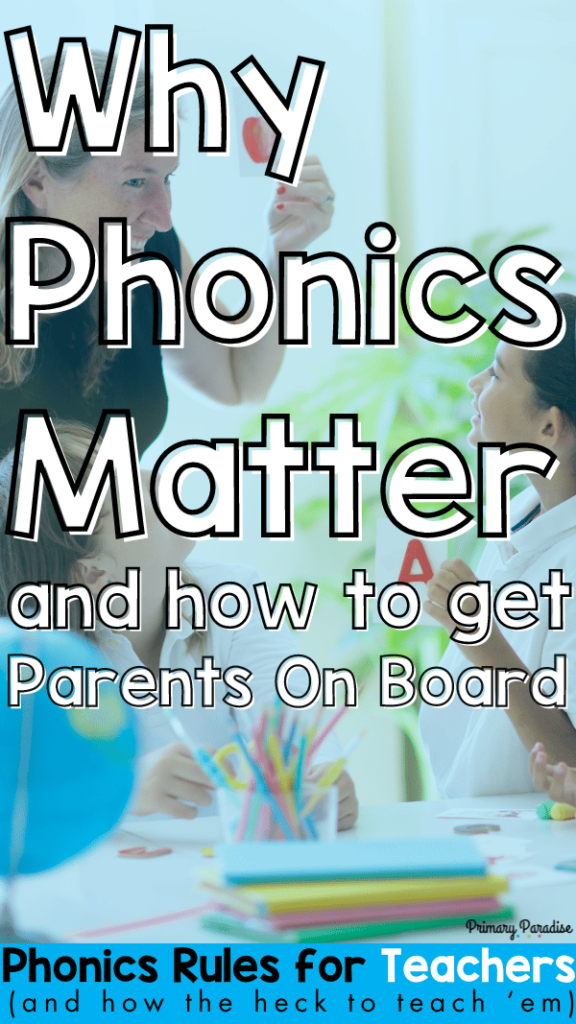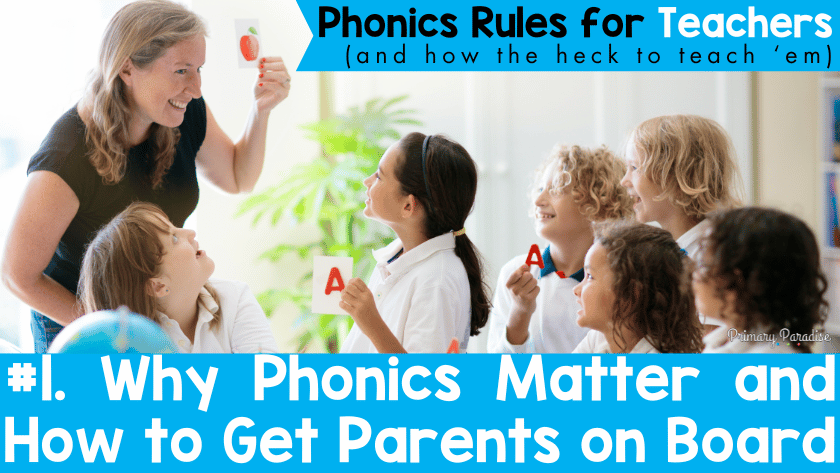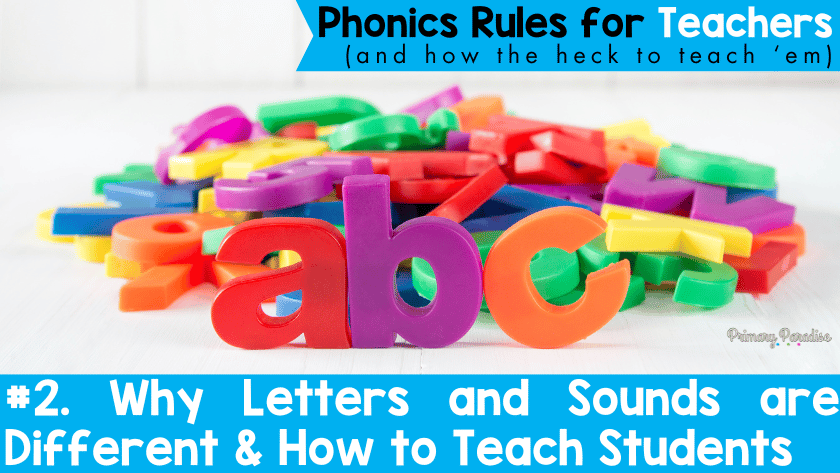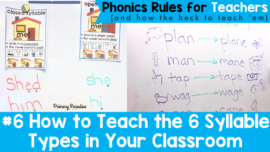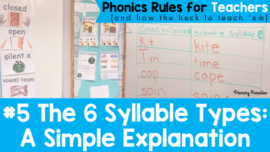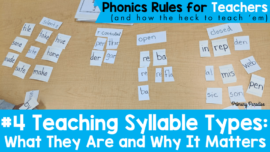Teaching phonics. If you’re an elementary school teacher, you are likely working hard to incorporate more phonics and structured literacy into your classroom. However, there’s a good chance that you didn’t actually learn this stuff in college. How are teachers supposed to use a structured, phonics based approach with their students if they don’t understand the rules themselves? The answer is this blog series- phonics rules for teachers (and how the heck to teach ’em).
In this series of blog posts, I will work to demystify the rules of the English language. Each blog post with include a simple explanation of an aspect of phonics instruction: written by a teacher for busy teachers. No gimmicks, no catches. Just clear phonics rules laid out in a way to save you time and stress.
Would you rather listen or watch? Find a podcast version of this blog post here, or watch the video below.
Who are you anyway?
A bit about me so you can decide if you want to listen to what I have to say. I’m Martha Moore, a teacher with 10 years of classroom experience. I’ve spent 7 years teaching first grade, 1 year teaching second grade, 2 years as a reading interventionist, and 12 years researching, learning, and creating effective and engaging classroom resources here at Primary Paradise.
And, I am not ashamed to admit that I did not begin my teaching career teaching phonics in an effective way. I began my career with a “balanced literacy” classroom and no clue how children actually learned how to read and write. When I realized things weren’t working after 5 years of teaching, I started looking for a better way to do things. After reading and research, I began to use a structured literacy approach and saw my students make tremendous leaps in their reading. So, I’ll share rules and strategies that have been effective in my classroom.
Why does teaching phonics actually matter?
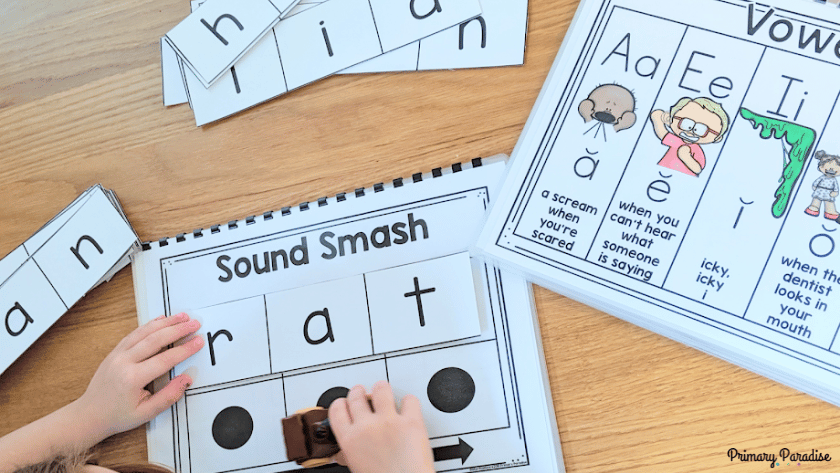
If you’re already onboard with the idea of teaching phonics, you can skip this part. However, if you’re still skeptical, keep reading. You might wonder “why is there such a big push for phonics all of the sudden”? The reality is that researched have known about the benefits of a phonics based approach for about 100 years. Let’s take a look at what we know about learning to read based on the research.
First, our brains are not wired to read or understand written language. While human brains are designed for spoken language, reading and writing is not a natural process. That means that it takes a lot of cognitive function to read. Since it’s a skill that doesn’t come naturally, it makes sense to make the process as logical and simple as possible.
The English language consists of 26 letters that make 44 sounds (or phonemes) that can be spelled about 250 ways (graphemes). If a child memorizes 10 words, they can read 10 words. However, if they a child learns 10 sounds, they can read hundreds, even thousands, of words. Teaching phonics rules matter because it allows children to build independence in their reading and eventually unlocks a world of written language.
Teaching the rules of phonics and the English language also matters because it unlocks a consistent code. People like to joke about how illogical English is, but the reality is that it’s a very logical language. 98% of words in English are decodable if you understand the spelling rules and patterns. So, if students learn the code, they will be able to confidently read just about any word they come across.
There are about 170,000 words in common use in the English language. There are about 250 graphemes (letter groups that spell a single sound). If my choice is to either memorize 170,000 individual words, or learn 250 graphemes (which is what we do with phonics), I know which I’d choose. (Hint, it’s not memorize 170,000 individual words.) Science supports this. The average, adult brain is capable of holding between 30,000 and 40,000 words in their memory. That means it’s just not possible for most people to only memorize whole words. This is why understanding phonics rules and the logical, English code is so important to reading success.
How Can We Explain Why We Teach Phonics Rules to Parents?
One thing about using a phonics based is that students’ grown ups might not always be on board. This might especially be the case if that’s not how they learned, or if they are pushing their child to read. Often times their concerns come from a place of wanting the best for their child without knowing how to get them there. In my experience, if you lay the facts out (much like I did above), it helps get the grown ups in your students’ life on board.
Explain the benefits of teaching phonics rules and how it helps children be able to read more confidently. While it might seem to take longer, it will give their child a strong foundation. If possible, share Scarborough’s Reading Rope so they can see all that goes into learning to read. You can also share the phonics rules with their grown ups as their children are learning as well. Once they understand the rules, it will help them see the logic of phonics. It will also give them confidence to help their child grow.
I’m in. Let’s learn about phonics rules for teachers!
If you’re thinking, “Sounds great! Let’s go!” You’re in the right place. Come back each week to learn a new phonics rule, strategy, or helpful background information. If you’re excited and ready to learn on your own, I highly recommend these two books: (Affiliate links. I receive a small compensation if you make a purchase at no extra cost to you.) The ABCs and All Their Tricks and Uncovering the Logic of English: A Common-Sense Approach to Reading, Spelling, and Literacy.
Keep reading. Next post in the series:
